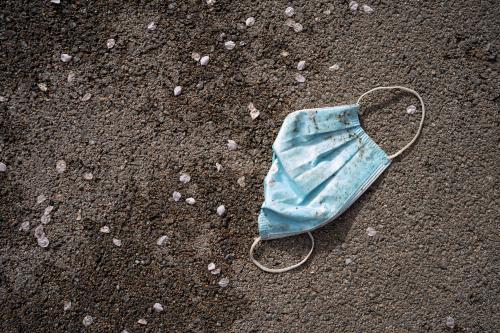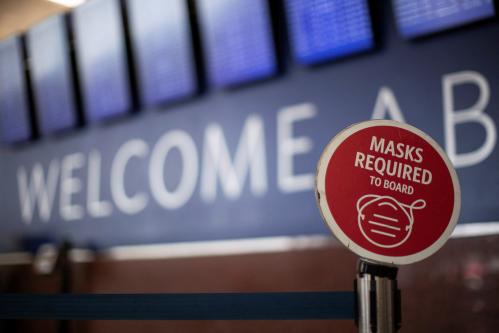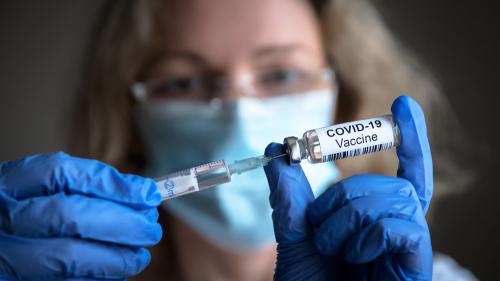More than a year after widespread COVID-19 vaccine availability in the United States, issues related to vaccines, including the need for additional boosters, the development of variant-specific doses, vaccines for children under five, and issues of global availability, continue to be in the headlines. Congress has struggled in recent months to approve more funds for vaccines, testing, and therapeutics—but legislating is not the only tactic the House and Senate have to respond to the ongoing crisis. Hearings, too, play an important role.
Data collected as part of Brookings’s on-going work on congressional oversight helps put these efforts in perspective. In 2021, approximately 5% of congressional hearings across the House and Senate focused on a health-related topic; this is actually slightly lower than the equivalent figures in the House in 2019 (8%) and 2020 (11%). Notably, however, as the vaccine began rolling out and Americans had the choice to get inoculated against COVID-19, Congress responded by focusing heavily on the issue. In 2021, 32, or one-third, of all health-related hearings contained a substantive focus on topics related to vaccines. (“Vaccine-related” hearings were those in which at least one or more testimonies contained a substantive focus on COVID-19 vaccinations.) In the House, over a third of these hearings were held by the Select Subcommittee on the Coronavirus Crisis, which was created near the beginning of the pandemic in April 2020. In the Senate, over half of all vaccine-related hearings were held by the Committee on Health, Education, Labor, and Pensions.
A deeper look at vaccine-related hearings provides insight into how Congress oversaw the development and rollout of the COVID-19 vaccine in 2021. All 32 vaccine-related hearings considered one or more of the following subtopics: vaccine development, distribution and rollout, and vaccine hesitancy. Vaccine development was discussed in 13 hearings, which analyzed clinical trials and efficacy of the vaccine to combat COVID-19 and its emerging variants. Even after the vaccine’s initial emergency authorization, development hearings continued to explore the vaccine’s resistance to new strains of the virus, the potential need for booster shots, and whether the vaccine was safe for children.
Skepticism regarding the vaccine was another area of focus, with the House and Senate holding a combined total of 15 hearings on vaccine hesitancy. In these hearings, the committees focused on the spread of misinformation and strategies to build vaccine confidence among skeptical Americans. Vaccine distribution was discussed in 27 hearings, with subtopics including the production and supply of available vaccines, challenges and successes with uptake, and barriers to vaccine access. Congress also explored vaccine equity in light of evidence that minority groups are less likely to be vaccinated and more likely to get seriously ill from contracting COVID-19. Accordingly, 10 hearings addressed uptake barriers in certain demographics and how to meet the needs of vulnerable communities in vaccine education and messaging.
Nine of the 32 vaccine hearings involved congressional oversight of the executive branch—three in the House and six in the Senate. These hearings primarily focused on the federal government’s COVID-19 response, with most oversight examining vaccine development and distribution. Only a handful of hearings considered vaccine-related topics at the state and local levels. In early February, Congress held one hearing to explore vaccine uptake at the state level, calling witnesses from states’ public health departments. Another February hearing featured witnesses from all the major vaccine companies—Pfizer, Moderna, Janssen, AstraZeneca, and Novavax—in which testimonies explained how the vaccine was developed and performed in clinical trials.
Vaccine-related hearings featured 131 separate testimonies and 112 individual witnesses, with a handful of witnesses testifying more than once. In a time characterized by uncertainty about the virus and the efficacy of vaccines, Congress relied heavily on public health officials to explain the benefits and challenges related to implementing COVID-19 vaccinations. Though only 15% of total witnesses were public health officials, household names such as NIH Director Dr. Anthony Fauci and CDC Director Dr. Rochelle Walensky testified multiple times, each appearing in seven hearings. They were followed by FDA Acting Commissioner Janet Woodcock and CDC Director Dr. Peter Marks, both of whom testified in one-third of all federal oversight hearings. 18 of the 32 vaccine hearings featured at least one public health official, and a fourth of total testimonies came from public health officials in 2021.
Congress also called on scholars and scientists to explain the intricacies of the virus and its spread, with a third of total witnesses representing academic witnesses. Though not technically public health officials who serve in the government, these witnesses provided crucial medical expertise, often holding M.D.s or Ph.Ds. Much like public health officials, academic witnesses testified about strategies to combat the virus and the ability to mitigate its spread through vaccinations. Other key witnesses included current and former federal government employees with health-related positions, such as Government Accountability Office Director of Health Care John Dicken, former Surgeon General Jerome Adams, and other former federal officials from HHS. Whether hearing from public health officials or scholars, Congress’s approach to public health required a broad range of health-related witnesses to clarify concerns about the vaccine.
Other witnesses in vaccine-related hearings included health care workers (12), individuals from advocacy groups (10), individuals representing private companies (9), representatives from professional associations (6), private citizens (4), and state and local government officials (2). Testimonies from health care professionals were especially important because they identified the challenges that frontline workers were facing in hospitals and healthcare centers. One witness, a nursing assistant, discussed widespread reluctance among nursing staff to get vaccinated. Another witness, a Chief Strategic Integration and Health Equity Officer at a hospital, testified about efforts to audit medical records to determine patients who had missed preventative screenings and create an on-site vaccination clinic at the hospital. Their perspectives highlighted the critical healthcare gaps that had an impact on vaccine uptake.
As of this writing, Congress is continuing to debate additional COVID-related spending that the White House says is needed to ensure widespread availability of a next generation shot, and efforts to oversee the approval of vaccines for young children continue as well. Vaccination, then, is likely to remain on Congress’s hearing agenda in the months to come.
The Brookings Institution is committed to quality, independence, and impact.
We are supported by a diverse array of funders. In line with our values and policies, each Brookings publication represents the sole views of its author(s).










Commentary
How has Congress responded to issues surrounding vaccinations?
May 13, 2022